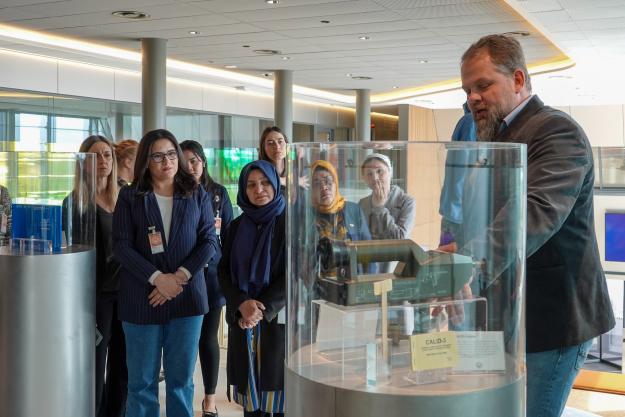
Mr. Jakub Michał Milczarek, OPCW Senior Analytical Chemist, speaks with participants about the different functions and uses of the equipment in OPCW’s exhibition, at the Symposium on Women in Chemistry at the OPCW ChemTech Centre
THE HAGUE, Netherlands—24 April 2025— Only 30% of the world’s researchers are women, and this gender gap is even wider in the so-called hard sciences such as chemistry. Increasing representation of female professionals in chemistry can contribute to accelerated innovation, improved performance and diverse perspectives in problem-solving in this field, concluded the OPCW Symposium on Women in Chemistry.
Over the course of two days, almost 100 participants – joining both online and in-person from around the world – discussed challenges and opportunities for women in chemistry and celebrated the remarkable achievements and leadership of female scientists in this field. In addition to presentations by the OPCW and other international organisations, as well as interactive panel discussions, participants also engaged in hands-on discussions with scientists at the OPCW Centre for Chemistry and Technology (ChemTech Centre) and had a first-hand look at how science underpins the Organisation’s work to achieve a world free of chemical weapons.
Closing the gender gap in chemistry
The speakers and participants at the Symposium highlighted the urgent need for systemic change to close the persistent gender gap in chemistry. Expanding mentorship opportunities, increasing the visibility of female role models especially from the global South, fostering clear pathways for career advancement, and implementing gender-inclusive policies and workplace cultures were identified as important measures to achieve equity in this field.

Symposium participants at the OPCW ChemTech Centre.
“The Symposium provided a powerful platform for sharing experiences, building networks, and learning from inspiring female leaders. One of my main takeaways is the importance of mentorship and collaboration in empowering women across all levels of the chemical profession. I am committed to applying what I have learned to strengthen support systems for women chemists in Indonesia – a country making ongoing efforts to strengthen women’s engagement and representation in the scientific community” said Ms. Mas Ayu Elita Hafizah, Product Stewardship Manager at Jakarta and participant in the workshop.
“Giving a voice and opportunity to women in chemistry unlocks new pathways for innovation, safety, and sustainability. Ensuring equal access and representation drives meaningful progress in the field and beyond – and it is our shared responsibility to lead and sustain this change,” said Ms Alice Rena, Programme Officer at the United Nations Interregional Crime and Justice Research Institute (UNICRI) and a facilitator of the group discussions at the event.
“When women are empowered to contribute in a meaningful way, we unlock the full potential of science to serve humanity and build a more inclusive, resilient future,” she highlighted.
AI and gender equity in chemistry
For the first time this year, the Symposium also featured emerging technologies, such as Artificial Intelligence (AI), as an important topic of discussion in relation to gender equity in chemistry.
If implemented with transparency and accountability, AI could be a force multiplier for gender equity in science and provide solutions for long-standing problems, such as unconscious bias in recruitment, unequal access to mentorship and funding, and the underrepresentation of women in leadership and research visibility.

H.E. Ms. Odette Melono, OPCW Deputy Director-General (middle), delivers closing remarks to participants at the Symposium on Women in Chemistry at the OPCW ChemTech Centre.
“As we embrace these technological breakthroughs, we must ensure that they further our efforts towards inclusivity rather than reinforce existing biases,” said OPCW Deputy Director-General, Ms Odette Melono.
“By harnessing emerging technologies in the right way, we can empower women in science, and in chemistry in particular, and enhance our collective ability to tackle the pressing challenges associated with chemical security and disarmament,” she highlighted.
To achieve this, however, women must be involved in the development and implementation of AI in chemistry from the beginning, including in shaping the ethical frameworks guiding this process, highlighted Ms Nazareen Ebrahim, AI Ethics Lead at Socially Acceptable and one of the speakers at the event:
“The role of women in AI governance is just as essential as their role in any other sphere of human life. What’s critical is inclusion — ensuring diverse voices are at the table to shape the democratic and humanitarian principles that will define AI governance in this new industrial age of humanity.”
Looking ahead
The Symposium made clear that building a more inclusive future in chemistry requires international cooperation, continuous investment, and sustained momentum. By fostering inclusive policies, supporting mentorship networks, promoting equity-driven innovation and providing platforms for discussion like the Symposium, international organisations such as the OPCW could be a catalyst for change to ensure that the next generation of chemists – regardless of gender – can thrive and lead in shaping a safer world in which chemistry is only used to advance progress, peace and prosperity.
Background
The OPCW Symposium on Women in Chemistry is one of the Organisation’s flagship events promoting gender equity in chemistry. Since the launch of the Symposium in 2016, more than 580 women chemists, legislators, chemical engineers, and first responders have benefited from the OPCW’s capacity building programmes. The Organisation provides targeted training and initiatives aimed at advancing equity within this field.
As the implementing body for the Chemical Weapons Convention, the OPCW, with its 193 Member States, oversees the global endeavour to permanently eliminate chemical weapons. Since the Convention’s entry into force in 1997, it is the most successful disarmament treaty eliminating an entire class of weapons of mass destruction.
In 2023, the OPCW verified that all chemical weapons stockpiles declared by the 193 States Parties to the Chemical Weapons Convention since 1997 — totalling 72,304 metric tonnes of chemical agents — have been irreversibly destroyed under the OPCW’s strict verification regime.
For its extensive efforts in eliminating chemical weapons, the OPCW received the 2013 Nobel Peace Prize.
